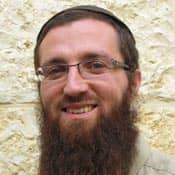It's well-known that the time period we're in now, counting from the holiday of Passover to the holiday of Shavuot, is all about preparing oneself for receiving the Torah. In particular, we do this by attempting to improve and change our character traits by rising above our reactive tendencies and natures, and proactively choosing a higher path and a higher way of living.
By elevating oneself above his or her knee-jerk reactions, a person achieves a certain freedom—a freedom of self.
It is only with that Freedom of Self that is hopefully achieved through this period that a person can make a truly independent choice to apply him- or herself to the Torah in a real way.
For this reason, we have the custom of studying the chapters of the rabbinic teachings of "Ethics of the Fathers" throughout this time of the year, since "Ethics of the Fathers" is primarily discussing conscious living by way of character refinement.
It is in these "Ethics of the Fathers" that we find Rabbi Yochanan, a sage of the Talmud, asking his top five students a critical question. He asks them to search out an all-inclusive Goodness that a person should acquire and live by.
Of course, the Jewish answer to this question of Goodness would obviously be the Torah. So, it would seem that the question really being asked here is: What is the all-inclusive Good trait by which Torah can be facilitated and brought forth?
The students of Rabbi Yochanan respond with five different answers:
- A good eye
- A good friend
- A good neighbor
- The ability to foresee the outcome of something that's happening now
- And a good heart—a lev tov
Ultimately, Rabbi Yochanan accepts the final answer, lev tov, since, as he states, a Good Heart includes all the others.
The Good Trait
A Chassidic master, the Bnei Yissoschar, asks another question on top all of this. He asks, "Where did these top Sages get their answers from in the first place? They are all very nice answers, but what led each of these Sages to their suggestion?"
The Bnei Yissoschar goes on to explain that, of course, these were not random guesses—or even educated guesses. These answers were calculated. They were based on the first time the concept of Goodness is mentioned in the Torah altogether: "Vayar Elokim et ha'Or kee tov," "And God saw the light—that it was good."
We won't go into the specifics here, but the Bnei Yissoschar goes on to detail exactly how each of these answers have their source in, or are connected to, that verse.
But we are still left with the question: How, in the Torah, do we see that the lev tov—the Good Heart—is inclusive of all the other Good traits?
So, we find a hint to this in the fact that the first time the word "good," tov, is stated in the Torah, it is the 32nd word from bereishit—from the beginning of the Torah. Thirty-two is the numerical value of the Hebrew word lev, as if to say that the all-inclusive concept of tov is lev—the all-inclusive concept of Goodness is a Good Heart.
How wonderful it is to be around a person with a lev tov! The lev-heart reflects emotion, passion, and the ability to empathize. Such a person also has the other qualities mentioned in that teaching in "Ethics of the Fathers" as well.
- A good eye—A person with a Good Heart is always looking to see the good in people and accept them for who they are.
- A good friend—A person with a Good Heart is always there for you, and after speaking with such a person you can't help but feel uplifted.
- A good neighbor—Besides being active in their communities, everyone who knows such a person loves them; no one has anything negative to say about him or her.
- The ability to foresee the outcome of something happening now—In order to deal with people, their relationships, raise a family, etc., one must be in touch with the unique personalities of the relationships/family he or she is dealing with as well as the society in which they live their lives. Such a person understands each member's particular path and nurtures each person's unique individual growth.
So, here we are in the time of counting the forty-nine days between Passover and Shavuot, when we are focused on refining our character, and in particular, building a lev tov—the all-inclusive good character—which has the Hebrew numerical value of 49. Today, we stand on Lag BaOmer, the 33rd day of the counting, the day in which we transition from lev (numerically valued at 32) to tov (numerically valued at 17)—from the first 32 days of the counting to the last 17 days of the counting, ultimately setting the stage for receiving the Torah on Shavuot.





